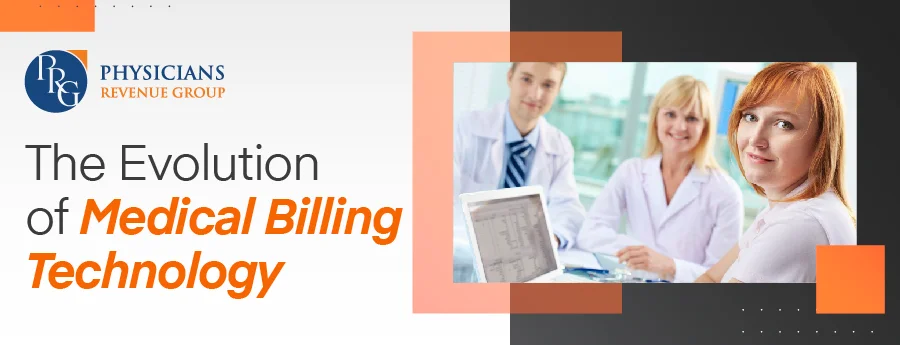
Email: info@prgmd.com | Call: +1 (630) 242-6474
Business hours: 9:00 to 5:00 | Monday to Friday
Email: info@prgmd.com | Call: +1 (630) 242-6474
Business hours: 9:00 to 5:00 | Monday to Friday

Table of Contents
ToggleThe ever-evolving coding and billing regulations and processes are impacting the future of medical billing services in the USA. Most recently, the major paradigm shifts in the medical care industry have altered the epitomes of medical billing forever. The evolution of medical billing technology is pivoting the technological advancements. These include telehealth, AI-based intakes, mail-order diagnostic tests, and smartphone apps for providing care. These technologies will continue to expand and become more integral to healthcare care and billing processes.
The healthcare system is constantly evolving and should match technology’s speed. It is essential to address patient needs effectively and to stay competitive. Recently, the healthcare industry has been facing numerous challenges, including the following:
These challenges present similar solutions in the form of modern medical billing technology. Implementing and adapting these technological solutions is imperative to the growth of your practice revenue. The process of technological advancements for physicians billing services includes the incorporation of modern equipment in addition to digital transformations via innovative systems and software.
The incorporation of medical billing technology in addition to healthcare digital technology has significantly improved various processes for healthcare practices. These include the following:
The top advantage of leveraging medical billing technology is streamlining each function. Technology usage in billing saves time, drastically reduces mechanical paperwork, and reduces the probability of errors, all of which positively affect the medical billing and care process.
Healthcare coding involves taking a patient’s treatment and diagnostics notes and translating them into correct alphanumeric codes. These codes are crucial for accurate medical billing and record keeping. The varying types of codes include the following:
After completing coding procedures, the patients’ claims or invoices generation begins. These bills are based on coding and sent to insurance companies for payments – this process is called medical billing. Insurance companies will either approve or deny payments based on the codes. It is important to note that any medical services/treatment not falling under a patient’s insurance plan will be directly sent to the patient for payment. Furthermore, the billing process starts when a patient books an appointment with a medical practitioner.
Until 20 years ago, medical billing and coding was performed manually. Manual coding and billing processing meant massive paperwork for coding, processing, and billing the claims. The paperwork could even increase if an insurance provider company denies payment due to billing or coding errors.
Medical billing is a complex process requiring time and resources. Take COVID-19 as an example; in times of a global pandemic, it gets increasingly difficult for healthcare practices to recruit and train professionals.
Especially professionals who are capable of handling both billing and coding tasks. It means that claims do not get filed or accurately processed, negatively affecting a practice’s revenue cycle.
The medical billing software redefines claims processing and payment collections for the healthcare industry. The best part is that software for healthcare works to streamline processes and reduce errors. This benefits medical practices, as the medical staff can solely focus on patient care.
EHRs are a valuable addition to the healthcare industry. EHRs are especially beneficial for streamlining the finances of medical practice. Furthermore, EHR software also helps maintain a complete and clear patient record in comparison to physical paperwork.
The five major coding types include the following:
Share:
Categories
Recently Added

What is a TPE Audit in Healthcare

What is an ABN in medical billing?

What does a Clearinghouse do During Claims Submission?
We Would Love to Assist You!
We treat your data confidentially and don’t share any information with a third party.